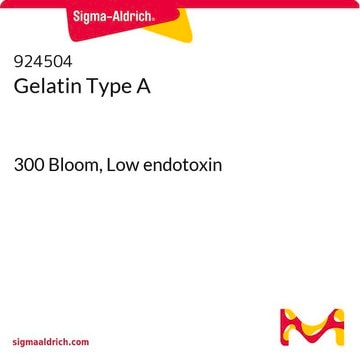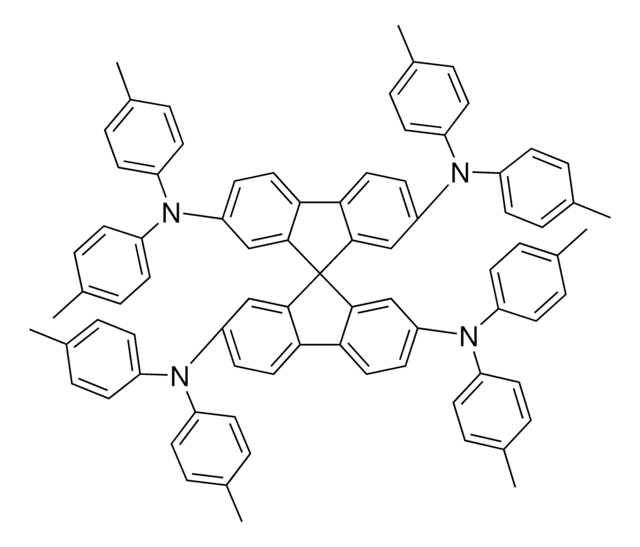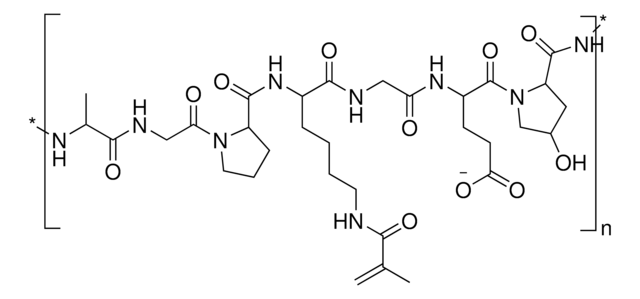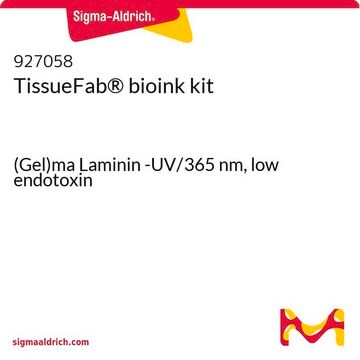おすすめの製品
品質水準
詳細
Application: 3D bioprinting, tissue engineering
フォーム
powder or chunks (or fibers)
色
white to light brown
保管温度
−20°C
関連するカテゴリー
詳細
Gelatin methacryloyl, also known as gelatin methacrylate or GelMA, is a methacrylate-functionalized gelatin biomaterial. The gelatin amine groups are chemically modified with methacrylate groups, which when combined with light and a photoinitiator, can be be photopolymerized to form a hydrogel with a three-dimension network that closely mimices the native extracellular matrix (ECM). GelMA is often used as a scaffold for cell culture and tissue regeneration, as it provides a supportive environment for cell attachment, proliferation, and differentation. Its properties, such as mechanical strength, degradation rate, and gelation behavior, can be adjusted by modifying the degree of methacrylation and crosslinking density.
Many GelMAs currently available have a high degree of variation and inconsistency. To address this, the TissueFab® Discrete GelMAs have been developed to achieve a specific degree of methacrylation with low batch to batch variability.
Many GelMAs currently available have a high degree of variation and inconsistency. To address this, the TissueFab® Discrete GelMAs have been developed to achieve a specific degree of methacrylation with low batch to batch variability.
アプリケーション
*Tissue engineering - including bone tissue, cartilage tissue, epidermal tissue, and cardiac tissue
*Regenerative medicine - including injectable tissue constructs and endothelial cell morphogenesis
*Drug and cell delivery - in the form of microspheres and hydrogels
*Surface coatings - of medical devices and implants in order to improve biocompatibility and release therapuetic cargos
*Regenerative medicine - including injectable tissue constructs and endothelial cell morphogenesis
*Drug and cell delivery - in the form of microspheres and hydrogels
*Surface coatings - of medical devices and implants in order to improve biocompatibility and release therapuetic cargos
特徴および利点
*Specific degree of methacrylation - a narrow peak of methacrylation allows for better reproducibility, low batch to batch variability, for improved consistency of gel properties and cell behavior.
*Biocompatibility - GelMA contains RGD sequences, found in collagen and other natural ECM proteins, which promote cell adhesion, proliferation, differentiation, and maturation of a variety of cell types.
*Biodegradability - GelMA contains matrix metalloproteinase (MMP) degradable sites that can be recognized and enzymatically degraded by cells. This allows the encapsulated cells to degrade and remodel the GelMA matrix, and repopulate with their own cells and tissues, a major goal for tissue engineering and regenerative medicine.
*Tunability - The TissueFab(R) Discrete GelMAs are available in a variety of degrees of substitution which ultimately impact the hydrogel stiffness and mechanical properties and can be used to recapitulate and accomodate different native tissues.
*Bioprintability - The TissueFab(R) Discrete GelMAs are widely used in the field of 3D bioprinting due to their unique gelation properties and the ability to print via extrusion and other methods to create intricate cell-encapsulated 3D structures with high cell viability.
*Biocompatibility - GelMA contains RGD sequences, found in collagen and other natural ECM proteins, which promote cell adhesion, proliferation, differentiation, and maturation of a variety of cell types.
*Biodegradability - GelMA contains matrix metalloproteinase (MMP) degradable sites that can be recognized and enzymatically degraded by cells. This allows the encapsulated cells to degrade and remodel the GelMA matrix, and repopulate with their own cells and tissues, a major goal for tissue engineering and regenerative medicine.
*Tunability - The TissueFab(R) Discrete GelMAs are available in a variety of degrees of substitution which ultimately impact the hydrogel stiffness and mechanical properties and can be used to recapitulate and accomodate different native tissues.
*Bioprintability - The TissueFab(R) Discrete GelMAs are widely used in the field of 3D bioprinting due to their unique gelation properties and the ability to print via extrusion and other methods to create intricate cell-encapsulated 3D structures with high cell viability.
法的情報
TISSUEFAB is a registered trademark of Merck KGaA, Darmstadt, Germany
関連製品
製品番号
詳細
価格
保管分類コード
11 - Combustible Solids
WGK
WGK 3
引火点(°F)
Not applicable
引火点(℃)
Not applicable
適用法令
試験研究用途を考慮した関連法令を主に挙げております。化学物質以外については、一部の情報のみ提供しています。 製品を安全かつ合法的に使用することは、使用者の義務です。最新情報により修正される場合があります。WEBの反映には時間を要することがあるため、適宜SDSをご参照ください。
Jan Code
938416-VAR:
938416-1G:
938416-BULK:
最新バージョンのいずれかを選択してください:
Covalent attachment of a three-dimensionally printed thermoplast to a gelatin hydrogel for mechanically enhanced cartilage constructs.
Boere KWM, et al.
Acta Biomaterialia, 10(6), 2602-2611 (2014)
Mineralized gelatin methacrylate-based matrices induce osteogenic differentiation of human induced pluripotent stem cells.
Kang H, Shih YR, Hwang Y, et al.
Acta Biomaterialia, 10(12), 4961-4970 (2014)
Direct-write bioprinting of cell-laden methacrylated gelatin hydrogels.
Bertassoni LE, Cardoso JC, Manoharan V, et al.
Biofabrication, 6(2), 024105-024105 (2014)
The 3D printing of gelatin methacrylamide cell-laden tissue-engineered constructs with high cell viability.
Billiet T, Gevaert E, De Schryver T, et al.
Biomaterials, 35(1), 49-62 (2014)
Facile one-step micropatterning using photodegradable methacrylated gelatin hydrogels for improved cardiomyocyte organization and alignment.
Tsang K, et al.
Advances in Functional Materials, 25(6), 977-986 (2015)
ライフサイエンス、有機合成、材料科学、クロマトグラフィー、分析など、あらゆる分野の研究に経験のあるメンバーがおります。.
製品に関するお問い合わせはこちら(テクニカルサービス)






